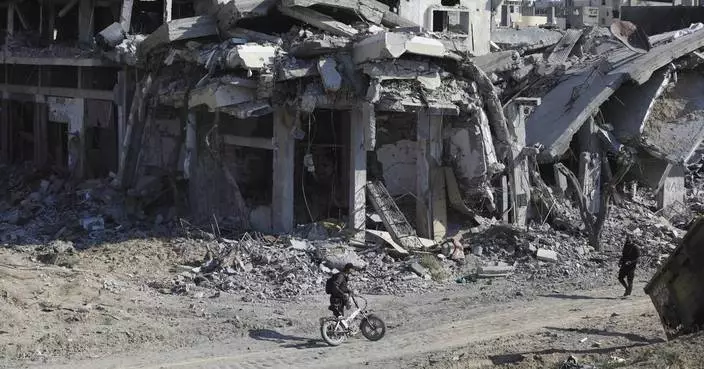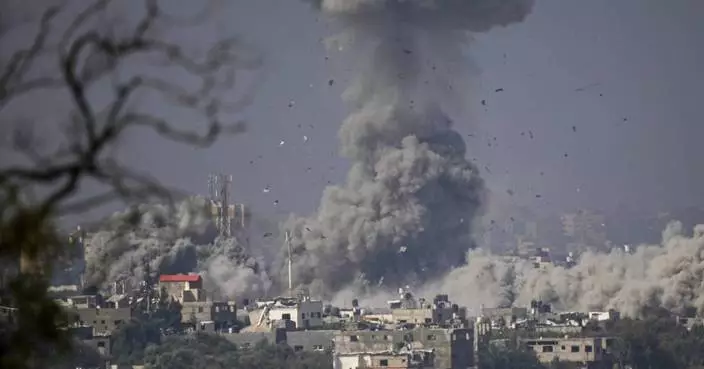Nicaragua said Tuesday that it has released all prisoners detained in relation to 2018 anti-government protests, though the opposition maintains that more than 80 people it considers political prisoners are still in custody.
President Daniel Ortega's government said in a statement that it has complied with a 90-day period for releasing such prisoners as part of negotiations this spring, a period that expired Tuesday.
According to the government statement, on March 27 an agreement was reached for the release of "people involved in the violent actions" during the protests, per a list that was reviewed by third parties.
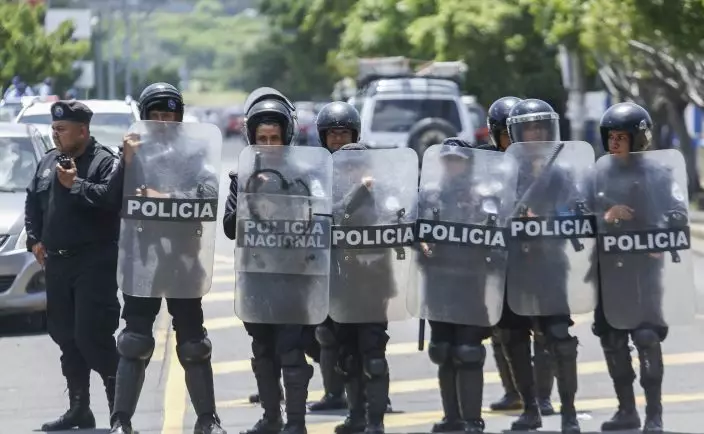
Police stand outside the Central American University (UCA), where they cannot legally enter, as they watch students protest inside the campus, demanding the release of all political prisoners on the last day of a 90-day period for releasing such prisoners, as agreed during negotiations between the government and opposition, in Managua, Nicaragua, Tuesday, June 18, 2019. Nicaragua's government said Tuesday that it has released all prisoners detained in relation to 2018 anti-government protests, though the opposition maintains that more than 80 people it considers political prisoners are still in custody. (AP PhotoAlfredo Zuniga)
It added that "all those people" are now free under a recently approved and controversial amnesty law, and under a commitment not to repeat their alleged offenses.
Carlos Tunnermann of the Civic Alliance opposition group said its members would meet with Roman Catholic officials to discuss the situation. He added that 84 prisoners were still behind bars, and they were not on the original list because they were arrested afterward.
The previous day he'd said more than 600 prisoners had been freed since February. The most recent group release of 56 people took place May 11 and included student and farm leaders.
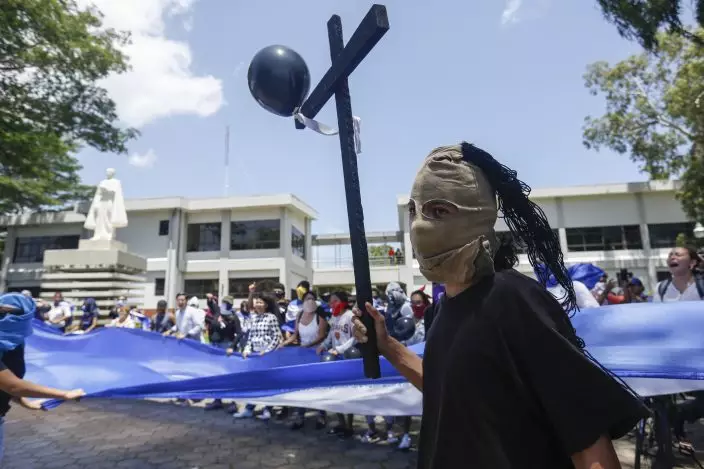
Students hiding their identify for fear of being identified and later attacked by security forces or government supporters protest inside the Central American University (UCA) to demand the release of all political prisoners, on the last day of a 90-day period for releasing such prisoners as part of negotiations between the government and opposition, in Managua, Nicaragua, Tuesday, June 18, 2019. Nicaragua's government said Tuesday that it has released all prisoners detained in relation to 2018 anti-government protests, though the opposition maintains that more than 80 people it considers political prisoners are still in custody. (AP PhotoAlfredo Zuniga)
Víctor Hugo Tinoco, a former deputy foreign minister under Ortega who has broken with the ruling Sandinista party, accused the president of trying to appear like he is making concessions while failing to live up to agreements.
"Ortega is demonstrating that he does not intend to free all the prisoners nor have early elections," Tinoco said, referring to two key opposition demands.
The protests erupted in April 2018 over a planned social security overhaul and broadened to include demands for Ortega's exit and early elections.
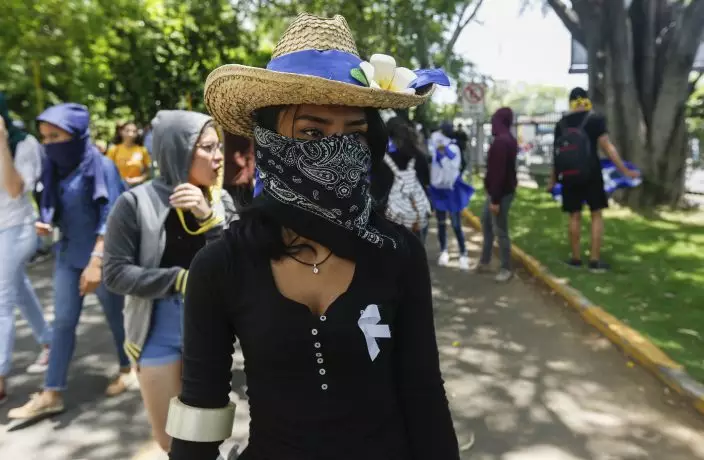
A student hiding her identify for fear of being identified and later attacked by security forces or government supporters attends a protest demanding the release of all political prisoners, on the last day of a 90-day period for releasing such prisoners as agreed to during negotiations between the government and opposition, on the Central American University (UCA) campus where security forces legally cannot enter in Managua, Nicaragua, Tuesday, June 18, 2019. Nicaragua's government said Tuesday that it has released all prisoners detained in relation to 2018 anti-government protests, though the opposition maintains that more than 80 people it considers political prisoners are still in custody. (AP PhotoAlfredo Zuniga)
At least 325 people died in a crackdown by security forces and armed, allied civilian groups, according to the Inter-American Commission on Human Rights. Over 2,000 were wounded, and tens of thousands fled the country into exile.
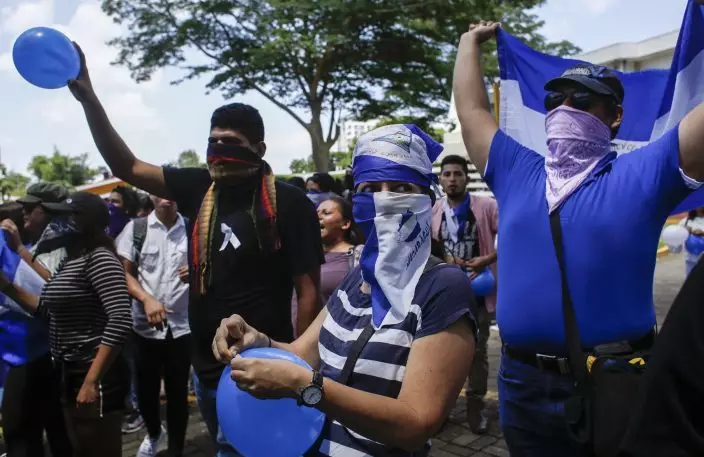
Students, many hiding their identify for fear of being identified and later targeted by security forces or government supporters, protest inside the Central American University (UCA) where security forces cannot legally enter, as they demand the release of all political prisoners in Managua, Nicaragua, Tuesday, June 18, 2019, the last day of a 90-day period for releasing such prisoners which was agreed to during negotiations between the government and opposition. Nicaragua's government said Tuesday that it has released all prisoners detained in relation to 2018 anti-government protests, though the opposition maintains that more than 80 people it considers political prisoners are still in custody. (AP PhotoAlfredo Zuniga)
THE HAGUE, Netherlands (AP) — Germany on Tuesday strongly rejected a case brought by Nicaragua at the United Nations' top court accusing Berlin of facilitating breaches of the Geneva Convention and international humanitarian law by providing arms and other support to Israel in its deadly assault on Gaza.
"The minute we look closely, Nicaragua’s accusations fall apart,” Christian Tams, a member of Germany's legal team, told the 16-judge panel at the International Court of Justice.
On Monday, Nicaragua urged judges to order a halt to German military aid to Israel, arguing that Berlin’s support enables acts of genocide and breaches of international humanitarian law in Gaza.
The head of Germany's legal team, Tania von Uslar-Gleichen, said Nicaragua's claims "have no basis in fact or law. They are dependent on an assessment of conduct by Israel, not a party to these proceedings.”
Preliminary hearings held Monday and Tuesday are focused solely on Nicaragua’s request for so-called provisional measures, including a court order for Berlin to halt military and other aid to Israel and reinstate funding to the U.N. aid agency in Gaza.
Closing Germany's arguments, Von Uslar-Gleichen urged judges not to impose preliminary measures and to toss out Nicaragua’s case.
Tams said that Germany had licensed only four exports of weapons of war to Israel since October, “three of which concern test or practice equipment.” He said 98% of military exports to Israel since the Oct. 7 attacks were not weapons of war, but other equipment.
Showing judges a photo of German aid being airdropped over Gaza, Tams added that Berlin continues to provide humanitarian support to Palestinians “every single day under extremely difficult conditions, constructively engaging with international partners.”
Nicaragua's case is the latest legal attempt to rein in Israel's offensive by a country with historic ties to the Palestinian people, after South Africa accused Israel of genocide at the same court late last year. It also comes against a backdrop of growing calls for Israel’s allies to stop supplying the country with weapons — and as some supporters, including Germany, have grown more critical of the war.
Speaking in Berlin, German Foreign Minister Annalena Baerbock told reporters that “from day one after Oct. 7, Germany has faced up to the incredible dilemma that Hamas deliberately entrenched itself behind civilians, deliberately used the human suffering of Palestinians and Palestinians in Gaza to expand its attack on Israel.”
Echoing comments by the German lawyers in court, Baerbock added that Germany is committed to international law, including the right to self-defense.
“This means that Israel has the right to defend itself, like every country in the world, against these terrorist attacks that continue to be carried out with the aim of destroying Israel as a state,” she said.
At Monday's hearings, Nicaragua’s Ambassador to the Netherlands, Carlos José Argüello Gómez, accused Germany of “failing to honor its own obligation to prevent genocide or to ensure respect of international humanitarian law.”
However, another lawyer for Germany, Samuel Wordsworth, argued that the court could not rule Germany was violating the obligation to prevent genocide because its judges have not ruled that Israel is breaching the Genocide Convention.
In a preliminary phase of the case brought late last year by South Africa, the U.N. court has said that it is “plausible” that Israel's actions in Gaza could amount to breaches of the convention.
“How can it be said that there was a failure to ensure respect of a third state, if the failure on the part of that third state to respect is not established in the first place?” Wordsworth said.
The court will likely take weeks to deliver its preliminary decision, and Nicaragua’s case will probably drag on for years.
Israel strongly denies that its assault amounts to genocidal acts, saying it is acting in self defense after Hamas-led militants stormed into southern Israel on Oct. 7, killing some 1,200 people.
Since then, more than 33,000 Palestinians have been killed in Gaza, according to the territory’s Health Ministry. Its toll doesn’t differentiate between civilians and combatants, but it has said women and children make up the majority of the dead.
According to the Stockholm International Peace Research Institute, Germany is second only to the U.S. in supplying arms to Israel — but it would be harder, if not impossible, for the U.S. to be brought before the court because Washington does not recognize the ICJ’s power to compel countries to appear before it. The U.S. also has not signed a protocol to the Genocide Convention that allows countries to bring disputes to the court.
Associated Press writer Kirsten Grieshaber in Berlin contributed to this report.
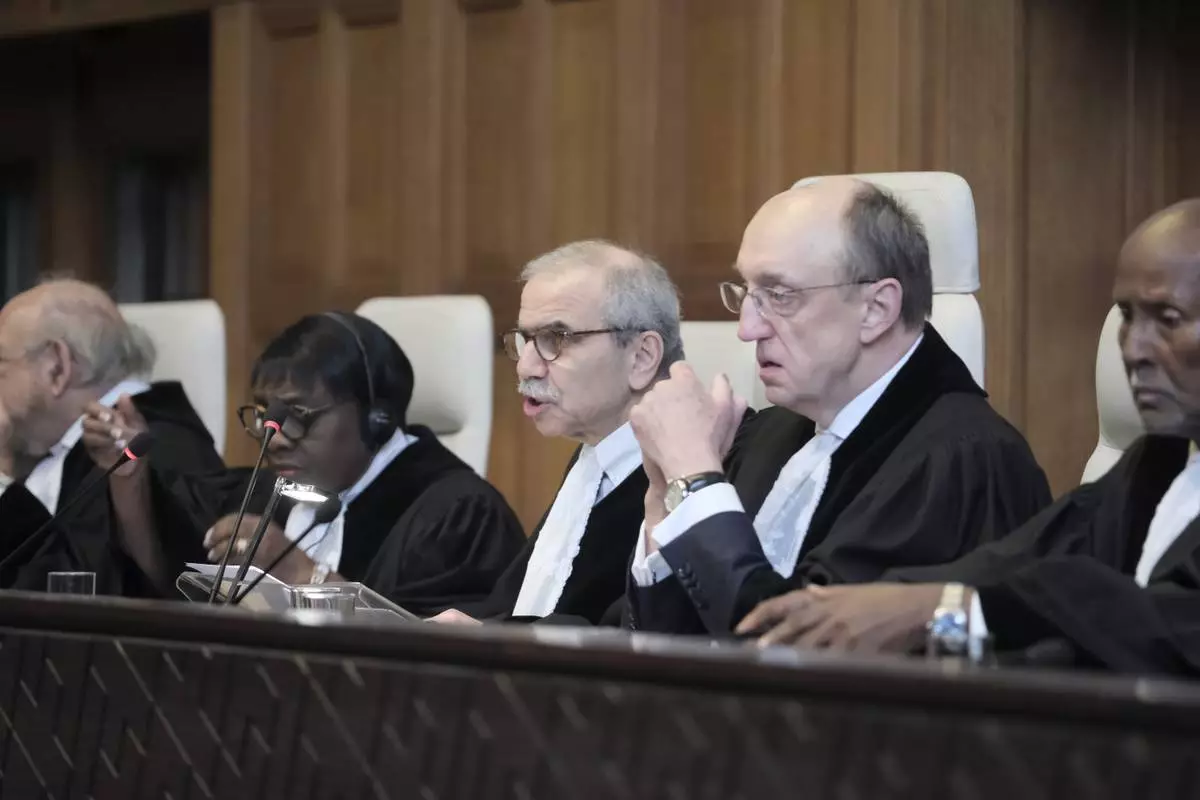
Judge Nawaf Salam, center, speaks at the start of a two days hearing at the World Court in The Hague, Netherlands, Monday, April 8, 2024, in a case brought by Nicaragua accusing Germany of breaching the genocide convention by providing arms and support to Israel. (AP Photo/Patrick Post)
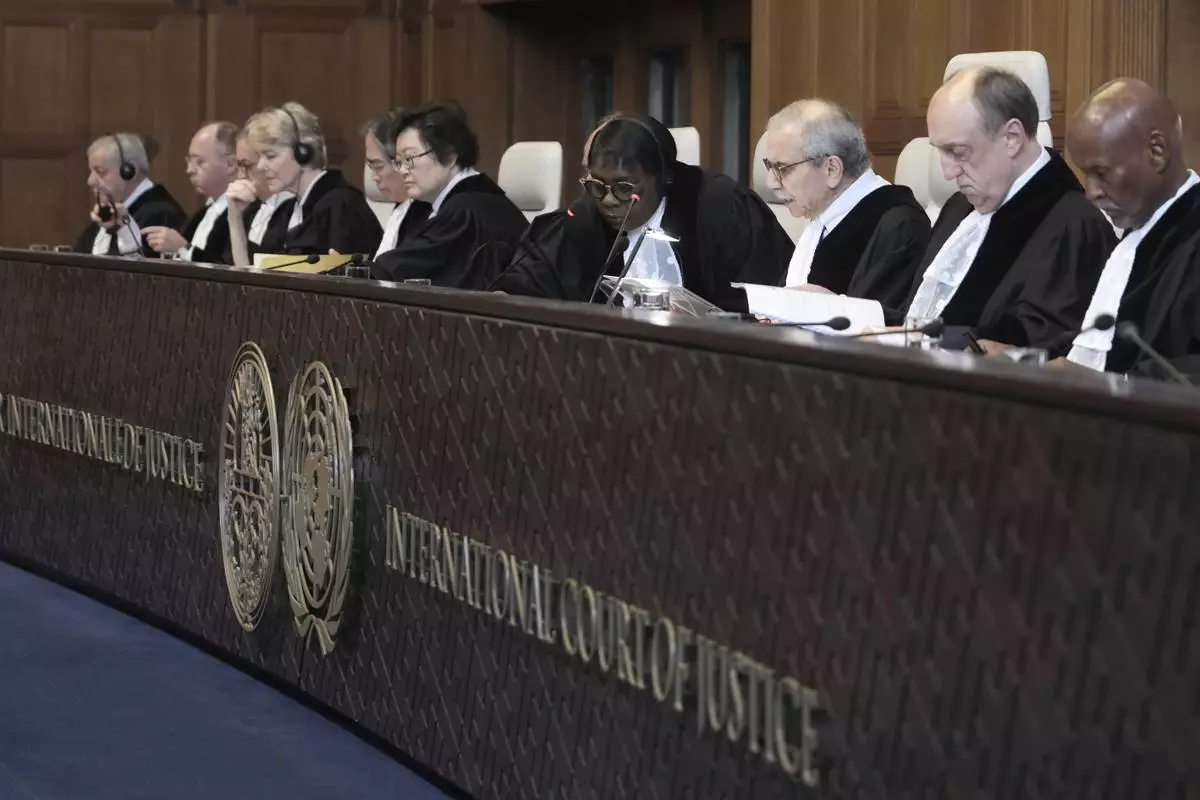
Judge Nawaf Salam, third right, speaks at the start of a two days hearing at the World Court in The Hague, Netherlands, Monday, April 8, 2024, in a case brought by Nicaragua accusing Germany of breaching the genocide convention by providing arms and support to Israel. (AP Photo/Patrick Post)
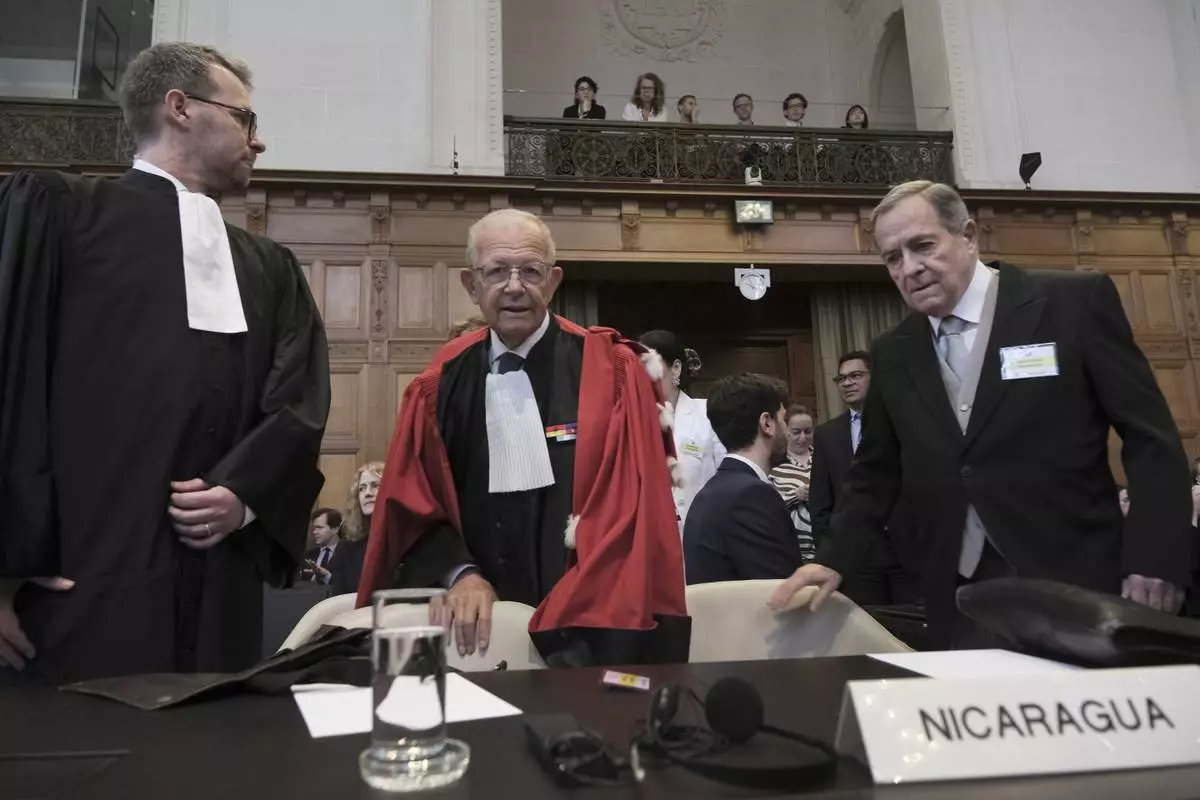
Nicaragua's Ambassador Carlos Jose Arguello Gomez, right, and Alain Pellet, center, a lawyer representing Nicaragua, arrive for the start of a two days hearing at the World Court in The Hague, Netherlands, Monday, April 8, 2024, in a case brought by Nicaragua accusing Germany of breaching the genocide convention by providing arms and support to Israel. (AP Photo/Patrick Post)

Tania von Uslar-Gleichen, Germany's legal adviser and Director-General for Legal Affairs of the German Foreign Ministry, center, shakes hands with Alain Pellet, left, a lawyer representing Nicaragua, prior to the start of a two days hearing at the World Court in The Hague, Netherlands, Monday, April 8, 2024, in a case brought by Nicaragua accusing Germany of breaching the genocide convention by providing arms and support to Israel. (AP Photo/Patrick Post)
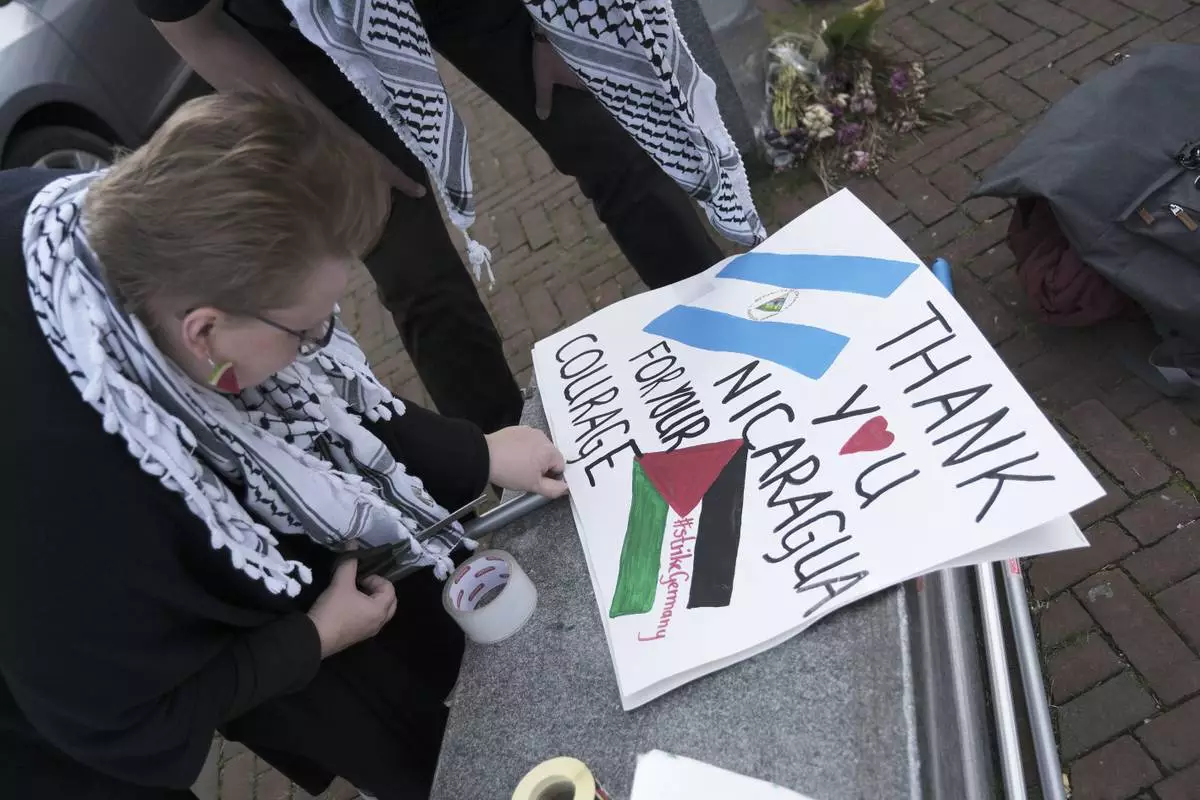
A pro-Palestinian activist works on a protest poster near the International Court of Justice, or World Court, in The Hague, Netherlands, Monday, April 8, 2024, prior to the start of a two days hearing in a case brought by Nicaragua accusing Germany of breaching the genocide convention by providing arms and support to Israel. (AP Photo/Patrick Post)
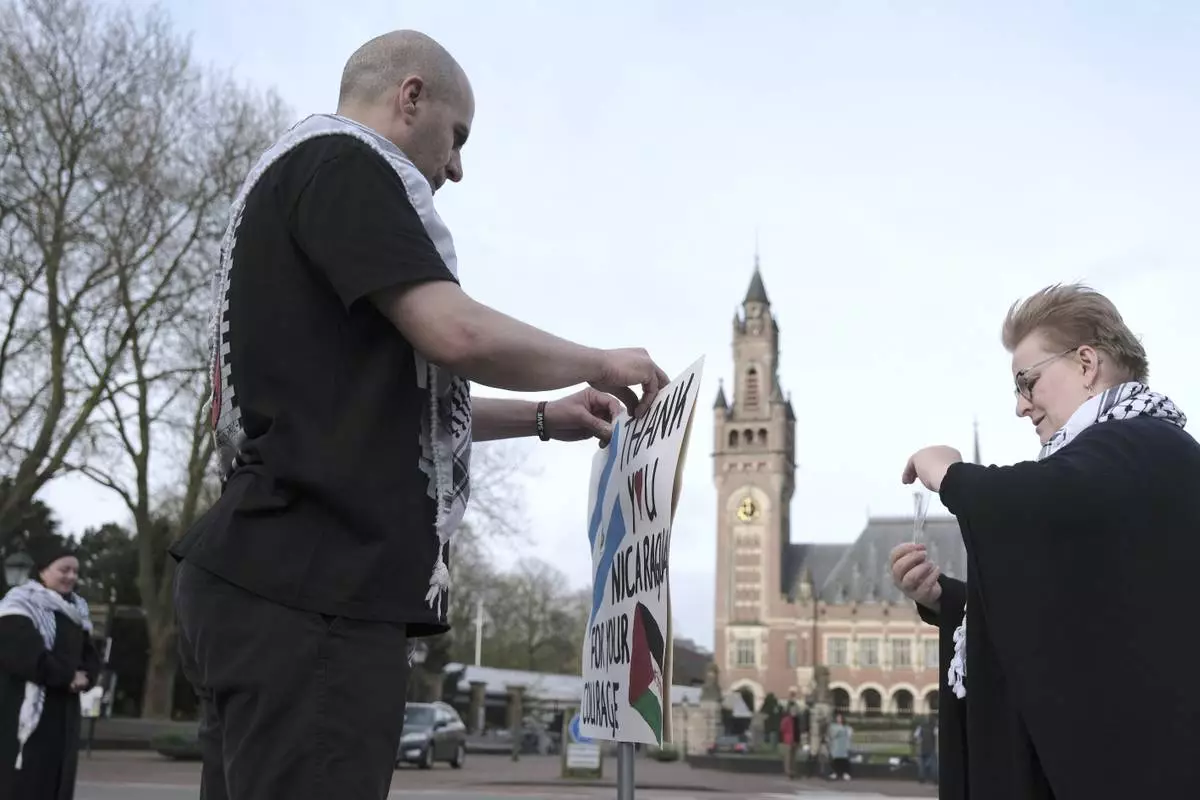
A pro-Palestinian activist works on a protest poster near the International Court of Justice, or World Court, in The Hague, Netherlands, Monday, April 8, 2024, prior to the start of a two days hearing in a case brought by Nicaragua accusing Germany of breaching the genocide convention by providing arms and support to Israel. (AP Photo/Patrick Post)













